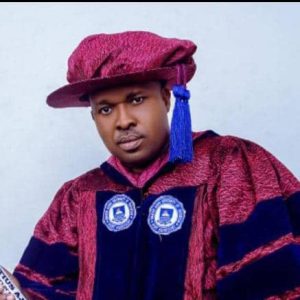The Department ran programme leading to the award of a Bachelor of Technology in Computer Engineering. The undergraduate programme was designed to provide fundamental knowledge and then deepen the students’ grasp of Computer Engineering.
It introduced them to the techniques and tools of research and development, and generally prepared them to face challenges and solve problems in the field of Computer Engineering/Information and Communication Technology. The Department operated with an interim accreditation from National Universities Commission (NUC), but had a denied accreditation in 2005. Following this denial, admission of fresh students was stopped, and the last batch of the students graduated in 2011.
In line with the exit report and recommendations of 2015 NUC accreditation team for the Faculty of Engineering, the need to ensure the recovery of Computer Engineering as a separate Department out of the present Electrical Engineering Department in the University became very apt. A Committee was put in place by the Head of Department of Electrical Engineering (Dr. S. Orike) in the 2016/2017 academic session to work out the modality, with Prof. C. O. Ahiakwo as the Chairman and Dr. Promise Elechi as Secretary. The Committee revised the programme curriculum in line with the provisions of both NUC and Council for the Regulation of Engineering in Nigeria (COREN)’s Benchmark Minimum Academic Standard (BMAS).
Senate in its 254th regular meeting held on 30th August 2018, gave approval to restart Computer Engineering as a distinct Department in the Faculty; and consequently, the Vice Chancellor appointed Dr. S. Orike (now Prof. Sunny Orike) as the Pioneer Acting Head of the Restarted Department.
Vision and Mission of the Department of Computer Engineering
VISION: To establish an exceptional and leading department that will be structurally and philosophically oriented to solve practical and peculiar challenging problems of mankind using Computer Engineering, its applications and developments.
MISSION: To produce high quality computer engineers equipped with sound research and practical ability in analysis, design, development and maintenance of computer systems and applications that support human civilization.
Programme Educational Objectives (PEOs)
The Programme Educational Objectives (PEOs) of the Department of Computer Engineering are:
- PEO 1 – Core Technical Competence (Engineering Knowledge): Graduates will apply fundamental principles of mathematics, science, and computer engineering, to analyze, design, and develop computing systems, embedded systems, and software applications to solve real-world problems.
- PEO 2 – Innovation & Problem-Solving: Graduates will demonstrate the ability to develop innovative solutions using emerging technologies such as artificial intelligence, machine learning, cybersecurity, and cloud computing to address industry and societal challenges
- PEO 3 – Ethical & Social Responsibility: Graduates will uphold ethical standards, environmental sustainability, and social responsibility while designing and implementing computer engineering solutions for a globalized world.
- PEO 4 – Leadership & Teamwork: Graduates will exhibit leadership qualities, effective communication skills, and teamwork in multidisciplinary settings to contribute effectively to technological and business projects.
- PEO 5 – Professional Development & Lifelong Learning: Graduates will engage in continuous professional development, pursue advanced studies, certifications, or research to remain updated with evolving technologies and industry trends.
Programme Outcomes (POs)
A graduate of the Computer Engineering programme is expected to have ability to:
- Engineering Knowledge: apply knowledge of mathematics, science, engineering fundamentals and an engineering specialization to the solution of developmental and complex engineering problems.
- Problem Analysis: identify, formulate, research literature and analyze developmental and complex engineering problems reaching substantiated conclusions using first principles of mathematics, natural sciences and engineering sciences.
- Design/Development of Solutions: proffer solutions for developmental or complex engineering problems and design systems, components or processes that meet specified needs with appropriate consideration for public health and safety, cultural, societal and environmental considerations.
- Investigation: conduct investigation into developmental or complex problems using research-based knowledge and research methods including design of experiments, analysis and interpretation of data, and synthesis of information to provide valid conclusions.
- Modern Tool Usage: create, select and apply appropriate techniques, resources and modern engineering and ICT tools, including prediction, modelling and optimization to developmental and complex engineering activities, with an understanding of the limitations.
- The Engineer and Society: apply reasoning informed by contextual knowledge including Humanities and Social Sciences to assess societal, health, safety, legal and cultural issues and the consequent responsibilities relevant to professional engineering practice.
- Environment and Sustainability: understand the impact of professional engineering solutions in societal and environmental contexts and demonstrate knowledge of and need for sustainable development.
- Ethics: apply ethical principles and commit to professional ethics and responsibilities and norms of engineering practice, including adherence to the COREN Engineers’ Codes of Conduct.
- Individual and Team Work: function effectively as an individual, and as a member or leader in diverse teams and in multi-disciplinary settings.
- Communication: communicate effectively on developmental or complex engineering activities with the engineering community and with society at large, such as being able to comprehend and write effective reports and design documentation, make effective presentations, and give and receive clear instructions.
- Project Management: demonstrate knowledge and understanding of engineering, management and financial principles and apply these to one’s own work, as a member and leader in a team, to manage projects and in multi-disciplinary environments.
- Lifelong Learning: recognize the need for and have the preparations and ability to engage in independent and lifelong learning in the broadest context of technological and social changes

